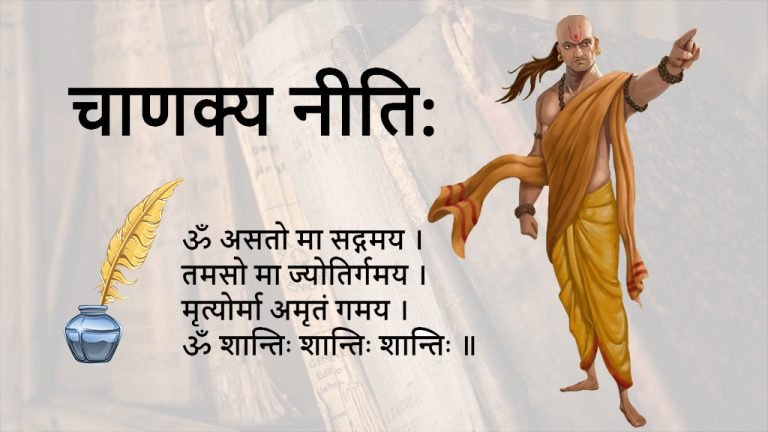Chanakya is considered the pioneer of the field of Political science and economics in India, and his work is thought of as an important precursor to classical economics. Chanakya the Great Economist was an ancient Indian polymath who was active as a teacher, author, strategist, philosopher, economist, jurist and royal advisor. He is traditionally identified as Kauṭilya or Vishnugupta, who authored the ancient Indian political treatise, the Arthashastra, a text dated to roughly between the fourth century BCE and the third century CE. The Arthashastra continued to exert considerable influence after the reign of Ashoka but then disappeared and was considered lost until it was discovered in 1905 CE by the Sanskrit scholar Rudrapatna Shamasastry (l. 1868-1944 CE). Rudrapatna Shamasastry published the work in 1909 CE and then translated it into English and published that version in 1915 CE which brought it greater attention.
Chanakya’s Arthashastra which is very famous by the name of Niti Shastra, describes 17 chapters and 342 sutras written in it. For details visit our site https://digitalksp.com/category/education/.
Chanakya NITI – 16th Chapter – in English
- Neither we devoted our time to the feet of God to get release from the mundane bonds of this earth, nor we accrued religious merit to ensure our place in heaven nor even in dreams we ever passionately embraced or pressed the solid softness of a woman’s breasts and thighs. Thus except for acting as an axe on our mother’s youthful beauty, what else did we achieve in the world? One wastes one’s life without attaining fulfillment of any of the four qualities explained above.
- The heart of a woman is not united; it is divided. While she is talking with one man, she looks lustfully at another and thinks fondly of a third in her heart.
- The fool (mudha) who fancies that a charming young lady loves him, becomes her slave and he dances like a shakuntal bird tied to a string.
- Who is there who, having become rich, has not become proud? Which licentious (Free) man has put an end to his calamities (A grievous disaster)? Which man in this world has not been overcome by a woman? Who is always loved by the king? Who is there who has not been overcome by the ravages of time? Which beggar has attained glory? Who has become happy by contracting the vices of the wicked?
- Who does not grow arrogant by becoming rich. When could indulgence in sensual pleasures end one’s grief? Whose heart has not been broken by women? Who could win the king’s favour forever? Who did not bear the evil glances of time? Which beggar could ever command regard? Who is the person who could return safe!y after being trapped in wickedness ? Chanakya has explained dramatically all the possible aspects of man’s life .
- No one did ever see or hear about any golden deer, nor was it ever created but it still beholds the craving of Raghunandan (Lord Ram). Indeed one’s wisdom fails at the onset or beginning of evil days.
- A man attains greatness by his merits, not simply by occupying an exalted seat. Can we call a crow a aquila bird (garuda) simply because he sits on the top of a tall building.
- It is virtue which is adored everywhere and not the riches or even excess of them. Is the full moon accorded the same respect as given to the minor moon?
- The man who is praised by others as great is regarded as worthy though he may be really void of all merit. But the man who sings his own praises lowers himself in the estimation of others though he should be Indra (the possessor of all excellences).
- If good qualities should characterise a man of discrimination, the brilliance of his qualities will be recognised just as a gem which is essentially bright really shines when fixed in an ornament of gold.
- Even one who by his qualities appears to be all knowing suffers without patronage; the gem, though precious, requires a gold setting.
- If not given proper support even the virtuous gets distressed. However blemish less he is a gem it needs a base to shine from.
- I do not want such wealth which is extorted by saddening someone, by unreligious and immoral means or by seeking shelter of enemies.
- What are uses of the money kept inside the house like a bride of an orthodox family and the money or riches which like prostitutes are enjoyed by all. In short, riches should be spent on the welfare of the virtuous who help the society. It should neither be amassed in a miserly way nor spent extravagantly.
- Those who were not satisfied with the enjoyment of wealth, food and women have all passed away; there are others now passing away who have likewise remained unsatisfied; and in the future still others will pass away feeling unsatisfied.
- Sweet words satisfy all. Hence all beings must be sweet in their language. The excessive use of sweet words does not make anyone poor.
- All sacrifice, gifts, donations etc. vanish in their effect after sometime but that which is given to a deserving person survives forever. Donations given to a worthy person is the best donation.
- A straw is light but cotton is even lighter than it. A beggar is lighter than even cotton. Why does not the wind fly it away? It is because the wind is apprehensive lest he may start begging something from it also. Begging is the meanest work for a human being.
- It is better to die than to lose prestige or respect. Death gives sorrow for a moment but loss of prestige or respect gives sorrow from day to day.
- There are two nectarean fruits hanging from the tree of this world: one is the hearing of sweet words (such as Krishna-katha) and the other, the society of saintly men.
- This world in the form of a pungent tree has nectarous fruits-sweet speech and good company
- The good habits of charity, learning and austerity practised during many past lives continue to be cultivated in this birth by virtue of the link (yoga) of this present life to the previous ones.
- Penance and knowledge, help the deserving persons gives one the rebirth, as a human being again.
- One whose knowledge is confined to books and whose wealth is in the possession of others, can use neither his knowledge nor wealth when the need for them arises.
- There is no use of knowledge that remains confined to books only. Similarly that money has no use which has gone under someone else’s control.






